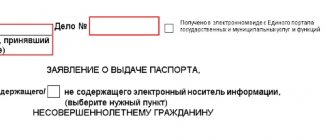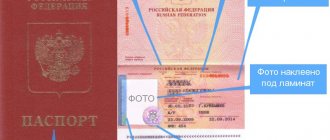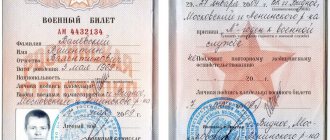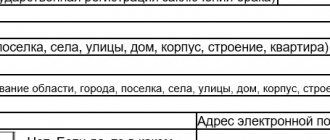Transliteration table for first and last names for a foreign passport:
a – a b – b c – v d – g d – d e – e f – e g – zh h – z i – i th – i j – k l – l m – m n – n o – o p – p r – r s – s t – t y – u f – f x – kh c – ts h – ch sh – sh sch – shch ъ – ie ы – y e – e yu – iu i – ia
Transliteration in a passport for traveling abroad
Errors in the spelling of last name/first name in a foreign passport are excluded under three conditions:
– the owner of the document, correctly and clearly printing the letters, enters the option into the form for the FMS;
– FMS service specialists enter data into the computer in full accordance with the sample and without contradicting the rules;
– a special program converts text from Russian alphabet to Latin alphabet.
When preparing data for entering your last name and first name in Latin letters into your international passport, you can use the online system to see what happens when the alphabet is converted by machine. But you need to look not only for an automated special program, of which there are many. You need to use a direct link to go to the GOST text and double-check the transliteration performed by the machine.
What if there is a discrepancy?
If one surname is written differently in different documents, there are two reasons: either a mistake was made, or the transliteration rules of different standards clashed. In the first case, replacement is required. The second refers to a situation where variable spelling is allowed due to divergences between old and new rules. Or the issue of adjusting the Latin version of the surname will be decided, taking into account the need for uniform recording in all documents.
The presence of an error is a reason to replace the passport, which with it is declared invalid. Moreover, if the application form was filled out correctly and a mistake was made by a FMS employee, the FMS service is obliged to issue a new paper passport 2 hours after submitting the photo (state duty is not charged). New passports take longer to process.
What to do if you need to match the last name in all documents, but the version in the passport issued according to the new rules will be different
If the entry option according to the 2014 rules does not coincide with the transliteration in other documents, the passport may be issued with a deviation from the new rules.
To do this, an application must be drawn up with a request for transliteration corresponding to the Latin version of the surname in other documents:
– the “header” is addressed to the head of the FMS department;
– indicate the required version of the last name and/or first name in Latin;
– motivation/justification is given why this is necessary (a single option is required for using financial, title and other documents);
– all documents are listed;
– a reference is made to clause 28.1.8 of FMS Order No. 211 dated March 26, 2014, in accordance with which the application is drawn up;
– photocopies of documents with the required transliteration are attached (birth and/or marriage certificates, residence permit, visa, old passport for travel abroad). A credit card will not be a compelling argument for deviating from the norm.
Deviation from the rules of transliteration of a proper name is not carried out simply at the request of the bearer of the surname without providing documents.
Source of the article: https://www.transliteratciia.ru/transliteraciya-imeni-i-familii-dlya-zagranpasporta/
Translation of the name Yuri into English for informal communication
If you need to say or write Yuri in English to communicate with foreigners, then the number of translation options is virtually limitless. Why? Because transliteration is not regulated by international standards, i.e. Every person is free to choose how to write their name. But, of course, there are popular variants, lesser-known translations, and the most original, extremely rare writing styles. For clarity, we give the translation of the name Yuri into English for each of the named groups.
So, in informal communication it is not necessary to follow the Russian standard, according to which Yuri is written in English in a foreign passport. On the contrary, it is better to use popular international transliteration systems, the methods of which will be closer and more understandable to a foreigner. And one of the most popular translations of the name Yuri is written as Yuri. This option is most often used in colloquial speech, media publications and fiction.
- Listen to me, Yuri! I promise you will be free. - Yuri, listen to me! I promise you will be free.
- In 1961 cosmonaut Yuri Gagarin visited Cuba. — In 1961, cosmonaut Yuri Gagarin visited Cuba.
- Yuri Fedorovich, to get on the trolleybus enter from the other side. — Yuriy Fedorovich, the entrance to the trolleybus is located on the other side.
There are also cases when Yuri is written in English as Yury or Yuriy. It would seem that this spelling is closer to Russian pronunciation, however, such forms are rarely used in speech.
- After the final match, Yuriy Ivanov told reporters that the team's goalkeeper was seriously injured. — After the final match, Yuri Ivanov told reporters that the team goalkeeper was seriously injured.
- During the clashes, Yury Timofeev destroyed fifteen armed enemies. — During the battles, Yuri Timofeev eliminated fifteen armed opponents.
And among the rarest variants, the English translation of the name Yuri as Youri deserves special attention. Agree, there is a kind of charm and grace in this word. The spelling of this translation is also interesting: you resembles an English pronoun identical in spelling, and the ending ri is somewhat reminiscent of the French manner of speech. It is all the more surprising that the overall pronunciation turns out to be the Russian name Yuri. So if you want to be original and stand out among the many namesakes, you can safely use this exact translation of the name.
- Youri Derevyanchenko – a Russian businessman, the main owner of the ABC corporation. — Yuri Derevyanchenko is a Russian businessman, the main owner.
However, in general, informal communication does not involve the use of the full form of the name. After all, even in Russian it is very rare for friends and loved ones to address a person as “Yuri.” The full form of the name gives off too much solemnity and formality. Therefore, in colloquial speech it is preferable to use abbreviated forms and affectionate nicknames. So we suggest you find out how Yura is spelled in English, as well as all the derivative forms of this name.
Other English topics: How to spell the patronymic Vladimirovich in English
What is transliteration?
Writing the last name and first name in the Latin alphabet is called transliteration. What exactly is indicated in the document depends on the information that the applicant writes in the application for issuance. Additionally, migration service employees do not carry out transliteration; they are required to write down the information as indicated by the applicant and not make mistakes.
To transliterate his first and last name for a foreign passport, each applicant can use the automatic transliteration program absolutely free of charge.
In essence, transliteration is tracing paper. In the case of surnames and given names, this is the writing of words in Latin letters.
Important! Don't confuse transcription and transliteration. Transcription is the writing of the sound of words using special phonemes that convey how the word should sound.
How to translate "Nikolai"
Let's look at how to transliterate the word "Nikolai"
Transliteration of Cyrillic into Latin
The problem of translating Cyrillic letters into Latin lies in the method of transmitting those sounds that do not have corresponding analogues in the Latin alphabet. As a rule, these include hissing and some vowels: ch, sch, a, yu, ya , etc. To convey these sounds, it is necessary to use combinations consisting of several letters. These combinations may vary depending on the method.
Let's take a closer look at each method. One of the most popular options is when Nikolay is written in English with the translation of the Russian letter “y” into the British “y”.
- Nikolay = Nikolay
This method is found in colloquial speech, in journalism, or various literary translations. However, it is important to know that in this case the British and Americans are likely to read it as [Nicholas]. Which is quite acceptable, but not entirely true. Therefore, according to the Russian transliteration standard, another writing option is preferable. According to it, the sound “th” is transmitted using the English “i”. In this case, we get the following combination:
- Nikolai = Nikolai
It is this method of transliteration that the Russian Federal Migration Service uses when issuing foreign passports. Therefore, it is believed that the option with the ending “i” is the most correct spelling of Nikolai in English. And the pronunciation of the word only confirms this version, because Nikolai [Nikolai] is much closer in sound to Russian than Nikolay [Nikolay].
There is another version of the letter that is widely used in the international transliteration system, but is not common in English-speaking countries. The fact is that according to this standard, the Russian “y” is conveyed by the letter “j”, which in many languages sounds like this – [th]. Accordingly, Europeans will read the inscription Nikolaj as [Nikolai]. However, in English j is j, so Americans or Britons will read this version as something like Nicolage.
What changes have occurred?
In 2021, adjustments have been made to the rules. New standards that have already come into force are similar to international ones adopted in other countries. They will eliminate misunderstandings for domestic tourists when traveling abroad.
The changes affected most popular Russian names and many common surnames. We list the replacements that are important to know:
- The letter “E” now also looks like “E” in transliteration. Previously it was written as "YE".
- “Y” received a new designation; now it looks like “I”. Previously it was indicated as "Y".
- The vowel “Yu”, when written, is transformed into “I” with the addition of “U”. Now this letter looks like “IU”, previously it was “YU”.
- Corrections have also been made to the spelling of “C”. Previously, it looked like “TS” in the passport, now it looks like “TS”.
- Another one of the typical Russian “Ъ” simply disappeared when translated into Cyrillic, but is now present and looks like “IE”.
It is worth considering specific examples in the old and new spelling. More specifically:
- The name Egor in the new format looks like Egor instead of the difficult to spell Yegor.
- Name Julia – Iulia
- Dmitry will be called Dmitrii in the new documents.
- The name Valery should be written like this – Valerii.
- An example of a surname is Tsaplin, previously the spelling looked like Tcaplin, now Tsaplin.
English translations for the male name Eugene and the female name Eugene
At its core, transliteration is the writing of Russian words in English letters. The concept of translation is somewhat different, since it involves searching for a similar word in a foreign language. And for most Russian names, finding similar English analogues is not difficult, since they are often based on a similar Greek or Latin root.
For example, in the Russian language, as in English, the name Eugene came from ancient Greek sources. Only the Slavs remade it to suit the spelling and pronunciation that was close to them, and the names Eugene and Eugene in English were adapted to the norms of British speech. Let us note that they sound extremely unusual to the Russian ear, however, the meaning of these names is the same. Look at the typical English translation of the name Evgeniy, and pay special attention to the transcription.
- Eugene [juːˈdʒiːn], [Eugene]
Yes, it is the English Eugene who is the namesake of our Russian Eugene. As already noted, both forms of the name have a single ancient Greek root, but the transformation of the Greek name into local phonetic norms changed the original pronunciation beyond recognition. So you shouldn’t be surprised at such a strong difference between the Russian Eugene and the English-speaking Eugene.
And since we’ve started the topic of translations, we’ll also find out how to spell the female name Eugene in English. As you probably already guessed, the English translation of the feminine form of the name is very similar to the masculine one and looks like this:
- Eugenia [juːˈdʒiːniə], [Eugenia]
These are the interesting variations of the names Eugene and Eugene found in the English language. Now you know all the details about them, and you can always choose the right form to introduce yourself or address people with these names. Good luck!
Views: 3,527
Checking using a special service
For translation, you can use visual tables in which Russian letters and new symbols are entered in accordance with the current rules. But if you don’t have time to do this or your first and last name are too long, then you can use a special service. All that is required in this case is to enter your data in the translation form and immediately receive the result in the second field.
The transliteration program operates according to the norms of the new law. It is available for use free of charge, both for residents of Russia, Ukraine and other countries.
What rules should you remember?
Current transliteration rules for your international passport:
- replacement of letters in the surname and first name is carried out sequentially according to the new transliterations;
- when using online services, it is still worth reviewing the result again;
- For a foreign passport you only need your first and last name;
- After entering the data into the application for a foreign passport, you should once again check the result of the service and self-transliteration.
How to write the name Alexey in English on a passport
Let's start with the most important aspect - paperwork. For example, you need to open an account in a foreign bank, fill out paperwork for purchasing real estate, or write a resume to look for a job. How to write Alexey in English in this case, many Russians wonder. And the answer is actually simple and lies on the surface: you should write exactly as your name was translated for the international passport. After all, “by seniority” a foreigner is considered the main document confirming the identity of a Russian citizen in foreign countries.
Therefore, you don’t have to invent a new idea – just take a ready-made translation from your passport. And if there is no way to see how the name is written there, then we will now tell you about the translation method in passport offices. Fortunately, since the beginning of the 2010s, a single spelling standard has been in force in Russia, and all divisions of the Federal Migration Service transliterate names in the same way. For translation, there is a special resolution containing a table comparing Russian letters and Latin characters. And specifically for the name Alexey, the correct spelling in English is as follows:
| Russian letter | A | L | E | TO | WITH | E | Y |
| Latin equivalent | A | L | E | K | S | E | I |
Pay attention to the two problem points we have discussed. The Russian standard suggests translating the letter combination KS separately, i.e. the corresponding letters "k" and "s". And the final “th” is expressed in English using the letter “i”. Note that by default the standard does not provide for any adjustments. In other words, any deviation from the official norm is unacceptable!
So, for Russian citizens, the spelling Aleksei is the only correct translation of the name Alexey into English. Accordingly, when preparing legally important documents, we recommend strictly adhering to this spelling. If, for example, you register real estate in the name of Alexey, and in your passport you have a translation of the name Aleksei, then problems may arise with identity confirmation. In such a situation, you will have to prove in court that Aleksei and Alexey are the same individual. Therefore, it is more profitable to prevent the occurrence of discrepancies and use the same spelling of the name Alexey in English letters in all documents.
Other English topics: Three forms of the verb break - translation, meanings, example sentences
This is about formalities. Now we suggest moving on to the nuances of colloquial speech and finding out how to say Lesha, Alyoshka and other abbreviated forms of the name in English.
Is it possible to keep my old name?
If the time has come to change your international passport, and you do not want to change the spelling of your first and last name according to the new requirements, then it is possible to leave the old version. In this case, you will need to spend a little more time and write a corresponding application. Such a right is given by Order No. 211 issued by the FMS in 2014, or more precisely, its paragraph 28.
The application must be written in free form, but there is an important point here - indicating the reason why the citizen wants to leave the previous spelling. Such a basis may be a document issued in the name and surname of a citizen in the old spelling. The following are considered significant:
- open visa;
- residence permit from another state;
- marriage certificate concluded with a foreigner;
- documents on education at a foreign university.
In order for the responsible authority to have the right to retain the old spelling, a copy of one of the specified documents must be submitted along with the application.
Other translation options for the name Alexey + situations of their use
Of course, it is not necessary to always and everywhere write the name Alexey in English, as it is written in the international passport. This form can be rationally used for documents and business correspondence. In personal communication, abbreviated forms are most often used, although, of course, presentation by full name is also allowed. But if you are communicating with a foreigner not on official business, then it is better to follow local traditions, i.e. Write not Aleksei, but at least Alexey or Alexei.
As for the abbreviated forms, translating them into English is very simple. True, the sound “e”, which is necessary to write Alyosha in English, as well as a number of other similar forms, can cause difficulty. Here, again, there may be several options, but for communication in English-speaking countries we recommend using the letter combination “yo”. Then you will get the following translations:
- Alyosha - Alyosha;
- Lyoshka - Lyoshka;
- Lyokha - Lyokha;
- Alexeyka - Alexeyka;
- Lyonya - Lyonya;
- Lex – Lex;
- Lyosha - Lyosha.
Please note that Lekha is written in English using the letter combination “kh”. This recording format is necessary for foreigners to pronounce the Russian “x” clearly, since in English the sound “h” is often a subtle exhalation.
Possible difficulties
It would seem not so difficult to rewrite personal data into English in the form of transliteration, but certain difficulties may still arise. At the same time, many are worried about what will happen if there are differences in spelling with other documents or errors are discovered. People have heard about problems if just one letter in documents does not match.
If an error is found
When receiving a passport, it is very important to check whether all the data in it is correct, first and foremost your first and last name. If an error is found in the spelling of letters in the Latin alphabet, then you should look for a statement that contains the original data. Depending on the detected result, the following actions are possible:
- The applicant made a mistake - it is his own fault and he changes his passport at his own expense. Collects documents, pays fees, waits for production.
- The employee made a mistake - the Main Directorate for Migration Affairs of the Ministry of Internal Affairs replies. In this case, officials are required to issue a new document within 2 hours. True, this only applies to paper passports. There is no need to provide new documents, nor do you need to repay the fee. All you need is a photo. If you are applying for a biometric passport, you will not be able to receive it earlier than in a week. All due to technical manufacturing features.
Important! You cannot use a passport with your fingerprints and even one letter written incorrectly. Such documents are considered invalid.
The most common mistakes:
- missing letter;
- extra letter;
- spelling error.
The name is written differently in the documents
If the foreign passport of a citizen of the Russian Federation and his visa have different spellings of his first and last names, then problems will not arise. This also applies to other documents with differences. This is only relevant if the differences are due to the application of new transliteration rules. Once the old passport expires, it will be replaced with a new one with the correct spelling. The same applies to documents and bank cards.
What to do if different documents contain different data
The most common problem is when different translations are made in different documents. What to do in such a situation?
The rules of the migration service indicate that if the spelling of the first and last name in the old and new passport differs due to changes in the transliteration rules, then no claims are made against the person, and representatives of other states do not have the right to carry out any additional processes checks. This is enshrined at the legislative level. But when the old passport expires, the correct translation must be made in the new document.
The same applies to bank cards, since until they are reissued, transfer data according to the old rules may be stored on them. Additional documents will need to be submitted:
- Russian Federation passport.
- International passport.
- Diploma.
- Marriage certificate.
- Birth certificate, etc.
General rules
Many Russian names have full-fledged analogues in English. For example, if the male Russian name Alexander can be replaced by the foreign Alex (Alex), and Mikhail - Michael (Michael), then this will not work with Dmitry. Only the transliteration method will be appropriate here.
Transliteration is when Cyrillic characters (Russian alphabet) are replaced with similar-sounding international Latin characters.
In other words, we write the name Dmitry in English letters. But here some difficulties may arise: the sound “i” can be translated in transliteration by the letters “y”, “j”, “i”, and even the neighboring “th” adds problems, because it is transmitted by the same symbols, and sometimes this sound is also They skip it altogether in transliteration.
Similar to English
Above we tried to transform the name “Nikolai” from the Cyrillic alphabet to the Latin alphabet. Strictly speaking, this is not really a translation. There is another way to “merge” into a foreign environment - to choose a suitable analogue of your name in the local culture.
Most names have the same origin.
The word Nicholas goes back to the ancient Greek name Nikolaos .
In Hellas, this was the name given to future great leaders, because the word is made up of two principles: victory + people = conqueror of nations, leader, commander. It is no wonder that such a worthy name was subsequently adopted in many countries. And each of them has its own variation.
For example, the English translation of Nicholas turned out like this – Nicholas [ˈnɪkələs]. About fifteen thousand newborn boys are called by this name every year. At the same time, we must not forget that there is also a female version - Nicole (Nicole). So representatives of the fair sex are also involved in the worldwide popularization of the ancient Greek name Nikolaos.







